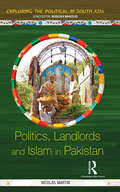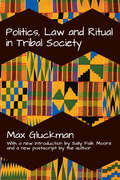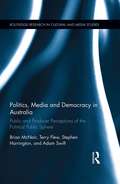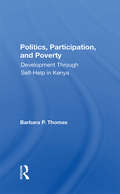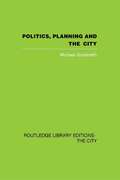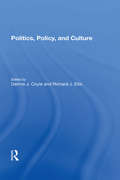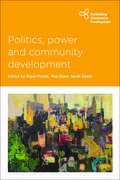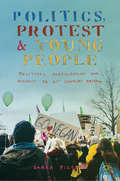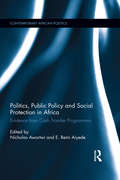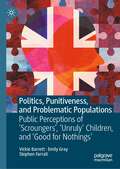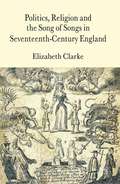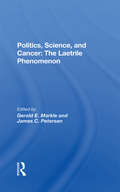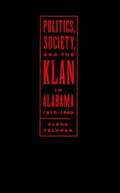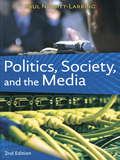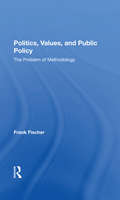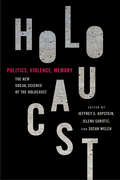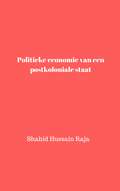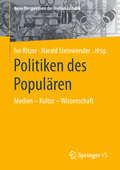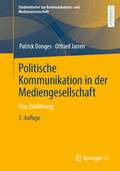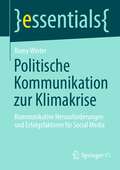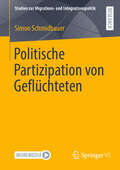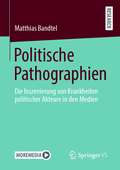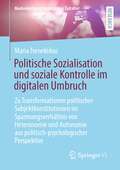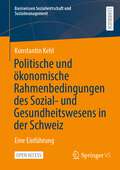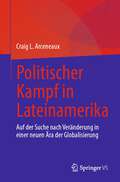- Table View
- List View
Politics, Landlords and Islam in Pakistan (Exploring the Political in South Asia)
by Nicolas MartinThis book offers unique insights into the changing nature of power and hierarchy in rural Pakistan from colonial times to present day. It shows how electoral politics and the erosion of traditional patron–client ties have not empowered the lower classes. The monograph highlights the persistence of debt-bondage, and illustrates how electoral politics provides assertive landlord politicians with opportunities to further consolidate their power and wealth at the expense of subordinate classes. It also critically examines the relationship between local forms of Islam and landed power. The volume will be of interest to scholars and researchers on Pakistan and South Asian politics, sociology and social anthropology, Islam, as also economics, development studies, and security studies.
Politics, Law and Ritual in Tribal Society
by Max GluckmanWhat can we learn from tribal societies about the ways in which, in a variety of social settings, groups of men resolve their conflicts with other men? In order to answer this question, Politics, Law and Ritual in Tribal Society compares nearly forty case study societies, most of them in Africa, in their reconstructed pre-colonial tribal condition, comparing their small-scale social relations to their large-scale social context. At the outset Gluckman explains to the reader that custom is the focus of interest of all types of anthropology. Yet his approach manifests a strong interest in economy, politics, and social relationships.In the volume, Max Gluckman offers a succinct version of a lifetime of opinionated analysis. This material is organized by theme and the ethnographic examples appear as brief illustrations of theoretical questions. Discussed here also is the relation between disputes and struggles for power within the context of mechanisms of social control and stability.In addition, Gluckman presents a step-by-step survey of the cumulative development of the anthropological analysis of tribal institutions, from the nineteenth century to the present, and supports the argument that anthropology is a science rather than an art. The new masterful introduction by Sally Falk Moore, along with a new postscript of Gluckman's professional activities and publications, provides newcomers to the work of Gluckman with deep insights into the contents as well as contexts within which the great anthropologist worked.
Politics, Media and Democracy in Australia: Public and Producer Perceptions of the Political Public Sphere (Routledge Research in Cultural and Media Studies)
by Terry Flew Adam Swift Stephen Harrington Brian McNairIn Australia, as in many comparable democracies, the role of the media in the political process is high on the public agenda. There is a perception of widespread disillusionment with and disengagement from politics amongst voters, and criticism of the media for failing to fulfil their democratic responsibilities adequately. This book evaluates public perceptions of the performance of the political media in the context of the declared aims and objectives of media producers. From there the authors present findings for improving the capacity of political media to engage and inform their audiences in ways which enhance the quality and popular legitimacy of the democratic process. These conclusions are of import not only to Australians, but to observers of mediated politics in the UK, the US and other countries where similar debates around the ‘crisis of public communication’ are on-going.
Politics, Participation, And Poverty: Development Through Self-help In Kenya
by Barbara Thomas-Slayter Barbara P. ThomasFocusing on the distribution of benefits in relation to class, ethnicity, and gender, this book explores the methods to which the rural poor can organize themselves to participate in economic and social development and examines the roles that self-help organizations play in the political economy of Kenya. Dr. Thomas looks at the competition for pow
Politics, Planning and the City
by Michael GoldsmithPolitics, Planning and the City is designed to introduce the complex political processes and problems of the modern city. The author begins by setting the theoretical context and discusses models of democracy, power and the nature of policy. Next he examines change and the city, by focusing on actual decision-making. Three major policy areas affecting the city - housing, planning and the social services - are then reviewed and the post-war experiences analysed. The author concludes by discussing the consequences, intended and unintended, for the city adn asks whether city governments can cope with the future. This book was first published in 1980.
Politics, Policy, And Culture
by Richard J Ellis Dennis J CoyleThis new set of original case studies is designed to offer an empirical counterpart to Cultural Theory (Westview, 1990 ), the landmark statement of political culture theory authored by Michael Thompson, Richard Ellis, and Aaron Wildavsky, and to extend and challenge the analysis developed there. Here, the theoretical concepts laid out in that book
Politics, Power and Community Development (Rethinking Community Development)
by Rosie R. Meade, Mae Shaw and Sarah BanksThe increasing impact of neoliberalism across the globe means that a complex interplay of democratic, economic and managerial rationalities now frame the parameters and practices of community development. This book explores how contemporary politics, and the power relations it reflects and projects, is shaping the field today. This first title in the timely Rethinking Community Development series presents unique and critical reflections on policy and practice in Taiwan, Australia, India, South Africa, Burundi, Germany, the USA, Ireland, Malawi, Ecuadorian and Peruvian Amazonia and the UK. It addresses the global dominance of neoliberalism, and the extent to which practitioners, activists and programmes can challenge, critique, engage with or resist its influence. Addressing key dilemmas and challenges being navigated by students, academics, professionals and activists, this is a vital intellectual and practical resource.
Politics, Protest and Young People: Political Participation and Dissent in 21st Century Britain
by Sarah PickardSarah Pickard offers a detailed and wide-ranging assessment of electoral and non-electoral political participation of young people in contemporary Britain, drawing on perspectives and insights from youth studies, political science and political sociology. This comprehensive book enquires into the approaches used by the social sciences to understand young people’s politics and documents youth-led evolutions in political behaviour. After unpicking key concepts including ‘political participation,’ ‘generations,’ the ‘political life-cycle,’ and the ‘youth vote,’ Pickard draws on a combination of quantitative and qualitative research to trace the dynamics operating in electoral political participation since the 1960s. This includes the relationship between political parties, politicians and young people, youth and student wings of political parties, electoral behaviour and the lowering of the voting age to 16. Pickard goes on to discuss personalised engagement through what she calls young people’s (DIO) Do-It-Ourselves political participation in online and offline connected collectives. The book then explores young people’s political dissent as part of a global youth-led wave of protest. This holistic book will appeal to anyone with an interest in young people, politics, protest and political change.
Politics, Public Policy and Social Protection in Africa: Evidence from Cash Transfer Programmes (Contemporary African Politics)
by Nicholas Awortwi Emmanuel Remi AiyedeAfrica is now in a much-improved position to support its poor and vulnerable people. It has more money, more policy commitment and abundant intervention programmes. Yet the number of citizens living lives of desperation, or at risk of destitution, is at an all-time high, and still rising. What is turning such positive prospects into such a disappointing result? Politics, Public Policy and Social Protection in Africa reveals key answers, drawing on empirical studies of cash transfer programmes in Botswana, Ghana, Kenya, Nigeria and Uganda. Social cash transfer might be the most effective "safety net" formula to emerge so far. The country chapters in this book explore why it works and how it might be harnessed for poverty alleviation. The studies uncover the very different motives of donors, politicians and the poor themselves for making it their preferred choice; why governments are not expanding the donor-driven pilot programmes as expected, and why ruling elites are not trying to help or hinder a concept which, on the face of it, could derail one of their most lucrative gravy trains. This book will be of value and interest to researchers and students of African politics, African social policy and sociology, as well as policy maker and donors.
Politics, Punitiveness, and Problematic Populations: Public Perceptions of 'Scroungers', 'Unruly' Children, and ‘Good for Nothings’
by Emily Gray Stephen Farrall Vickie BarrettThis book speaks to those interested in topics related to punitiveness and public attitudes to crime and punishment. Punitiveness has been the focus of increasing criminological attention in recent decades. This book extends this focus by taking a multi-disciplinary approach to examining punitiveness in the criminal justice system, the welfare system, and the education system in British society today. In doing so, this study uses new survey data (n=5,781) applying ordinal and linear regression and structural equation modelling to examine the relationship between public punitiveness towards ‘rulebreakers’ and political values. This is explored through assessing punitive attitudes towards the treatment of i) school pupils who break school rules, ii) towards the treatment of benefit recipients who fail to comply with the rules, and iii) towards people who break the law. It examines the relationship between political attitudes (neo-conservative values, neo-liberal values), nostalgic values (social, economic, and political), and public punitive attitudes towards the three rule-breaking groups. This book’s appeal may extend to an interdisciplinary audience including welfare, education, and social policy disciplines.
Politics, Religion and the Song of Songs in Seventeenth-Century England
by Elizabeth ClarkeThe Song of Songs , with its highly sexual imagery, was very popular in seventeenth-century England in commentary and paraphrase. This book charts the fascination with the mystical marriage, its implication in the various political conflicts of the seventeenth century, and its appeal to seventeenth-century writers, particularly women.
Politics, Science And Cancer: The Laetrile Phenomenon
by James C. Petersen Gerald E. MarkleAt no time in U.S. history has there been a more effective challenge to medical expertise and authority than that mounted by the contemporary Laetrile movement. The efficacy of Laetrile has been debated for over twenty-five years, but despite vigorous opposition from the medical community, support for the purported cancer treatment continues to gro
Politics, Society and the Klan in Alabama, 1915-1949
by Glenn FeldmanThe Ku Klux Klan has wielded considerable power both as a terrorist group and as a political force. Usually viewed as appearing in distinct incarnations, the Klans of the 20th century are now shown by Glenn Feldman to have a greater degree of continuity than has been previously suspected. Victims of Klan terrorism continued to be aliens, foreigners, or outsiders in Alabama: the freed slave during Reconstruction, the 1920s Catholic or Jew, the 1930s labor organizer or Communist, and the returning black veteran of World War II were all considered a threat to the dominant white culture. Feldman offers new insights into this "qualified continuity" among Klans of different eras, showing that the group remained active during the 1930s and 1940s when it was presumed dormant, with elements of the "Reconstruction syndrome" carrying over to the smaller Klan of the civil rights era. In addition, Feldman takes a critical look at opposition to Klan activities by southern elites. He particularly shows how opponents during the Great Depression and war years saw the Klan as an impediment to attracting outside capital and federal relief or as a magnet for federal action that would jeopardize traditional forms of racial and social control. Other critics voiced concerns about negative national publicity, and others deplored the violence and terrorism. This in-depth examination of the Klan in a single state, which features rare photographs, provides a means of understanding the order's development throughout the South. Feldman's book represents definitive research into the history of the Klan and makes a major contribution to our understanding of both that organization and the history of Alabama.
Politics, Society, and the Media, Second Edition: Canadian Perspectives (Communication, Society And Politics Ser.)
by Paul Nesbitt-LarkingPolitics, Society, and the Media is the first comprehensive political sociology of the media to be published in Canada. Paul Nesbitt-Larking draws upon a range of disciplines, including cultural and media studies, political economy, social theory, and political science to provide an analysis of the relationship between power and representation in Canada. The framework for the book presents a model of the mutual interaction between politics and the media. Attention is focused in the early chapters on how cultural, ideological, economic, and governmental forces shape and condition the production of media in Canada. Chapters on the work of Innis, Grant, McLuhan, and their postmodern successors place the evolution of McLuhan's theoretical argument that "the medium is the message" at the heart of the book. Canadian identity, and how to understand Canadian media politically, is the subject of a chapter on textual analysis. Two extensive chapters follow on the media’s influence and effects on politics. In addition to standard topics on politics and the media, this new edition offers much more: an examination of the media on the politics of gender and aboriginal peoples, the micro-politics of the media workplace, and an exploration of important media-related considerations. Throughout, reference is made to relevant and compelling issues placed within the context of media theory.
Politics, Values, And Public Policy: The Problem Of Methodology
by Frank FischerAddressed to the growing concerns about norms and values in policy assessment, this study develops a methodology for the political evaluation of public policy. It is designed to move policy evaluation beyond its current emphasis on efficient achievement of goals, focusing instead on the assessment of the acceptability of the goals themselves, emplo
Politics, Violence, Memory: The New Social Science of the Holocaust
by Susan Welch Jeffrey S. Kopstein Jelena SubotićPolitics, Violence, Memory highlights important new social scientific research on the Holocaust and initiates the integration of the Holocaust into mainstream social scientific research in a way that will be useful both for social scientists and historians. Until recently social scientists largely ignored the Holocaust despite the centrality of these tragic events to many of their own concepts and theories. In Politics, Violence, Memory the editors bring together contributions to understanding the Holocaust from a variety of disciplines, including political science, sociology, demography, and public health. The chapters examine the sources and measurement of antisemitism; explanations for collaboration, rescue, and survival; competing accounts of neighbor-on-neighbor violence; and the legacies of the Holocaust in contemporary Europe. Politics, Violence, Memory brings new data to bear on these important concerns and shows how older data can be deployed in new ways to understand the "index case" of violence in the modern world.
Politieke economie van een postkoloniale staat: Pakistan Economy: Een CaseStudy Geschiedenis, uitdagingen en respons 1947-2020
by Shahid Hussain RajaEen casestudy van Pakistan 1947-2020 Hoe historische bagage van kolonialisme in wisselwerking met neokoloniaal economisch beleid de inhoud en het verloop van de ontwikkeling van een postkoloniale staat beïnvloedt Politieke economie van een postkoloniale staat: Pakistan was een typische onderontwikkelde Staat toen het zijn reis als een onafhankelijke natiestaat begon op 14 augustus 1947, met talloze uitdagingen, variërend van existentiële dreiging tot revolutie van stijgende verwachtingen van de massa's en het worden van een onafhankelijke, zelfverzekerde en welvarende staat in de gemeenschap van naties aan de andere kant. De nieuwe Staat ging deze uitdagingen moedig aan en begon zijn reis letterlijk vanaf nul. Van een van de minst ontwikkelde landen ter wereld ten tijde van haar onafhankelijkheid, groeide de Pakistaanse economie met een vrij indrukwekkend tempo van 6 procent per jaar gedurende de eerste vier decennia van het bestaan van de Natie. Gedurende deze periode verdubbelde het inkomen per hoofd van de bevolking, ondanks het feit dat de bevolkingsgroei nooit onder de 3% per jaar uitkwam. Dankzij genereuze militaire en civiele hulp in de jaren zestig en daarna in de jaren tachtig bleef de inflatie laag en daalde de armoede van meer dan 45% tot minder dan 20%. Dit momentum kon daarna echter niet worden gehandhaafd vanwege de minder vriendelijke externe omgeving en het onhandige macro-economische beheer van de opeenvolgende regimes in de jaren negentig. De economische groei bleef iets hoger dan de bevolkingsgroei en de inflatie overschreed jaar na jaar de dubbele cijfers. Bijgevolg steeg de armoede tot 33%, de buitenlandse schuld explosief tot bijna het gehele BBP van Pakistan, het hoogste in Zuid-Azië. In de jaren 2000 keerde Pakistan terug naar zijn militaire fase en werd het opnieuw een frontlinie in de nasleep van 11 september, waardoor de Amerikanen in dit deel van de wereld kwamen en daarmee de gebruikelijke instroom van militaire en
Politiken des Populären: Medien – Kultur – Wissenschaft (Neue Perspektiven der Medienästhetik)
by Ivo Ritzer Harald SteinwenderDer Band befragt populäre Kultur auf ihre politischen Implikationen in medialen Erscheinungsformen. Dabei problematisiert er die tradierte Dichotomie von „Kunst“ und „Pop“, um den Fokus auf offene Forschungsfragen globaler Wechselwirkungen zu legen und über die akademischen Disziplinen hinaus zu erweitern. Die einzelnen Beiträge des Bandes nähern sich dem Untersuchungsgegenstand anhand mehrerer Konfliktlinien, die ein Themenspektrum von Fragen der Ideologie, Postkolonialität und Queerness populärer Medienkulturen eröffnen. Der InhaltMediale Regimes und Populärkultur ● Genre, Gesellschaft und Politik ● Gender und RaceDie HerausgeberProf. Dr. Ivo Ritzer lehrt Medienwissenschaft an der Universität Bayreuth. Dr. Harald Steinwender ist Redakteur im Programmbereich Spiel – Film – Serie des Bayerischen Rundfunks und Programmplaner für das BR Fernsehen.
Politische Kommunikation in der Mediengesellschaft: Eine Einführung (Studienbücher zur Kommunikations- und Medienwissenschaft)
by Patrick Donges Otfried JarrenPolitische Kommunikation in der Mediengesellschaft ist ein komplexer und vielschichtiger Forschungsgegenstand. Das Lehrbuch legt den Schwerpunkt auf die Strukturen, Akteure und Prozesse politischer Kommunikation und analysiert diese aus einer kommunikationswissenschaftlichen Perspektive unter Berücksichtigung der Theorie- und Forschungsbestände anderer Sozialwissenschaften. Politische Medieninhalte werden als das Ergebnis von Interaktionsprozessen verstanden, die im Rahmen von Strukturen der Politik wie der Medien zwischen politischen und medialen Akteuren stattfinden. Dabei wird der Mesoebene der Organisationen wie der Makroebene der Gesellschaft besondere Aufmerksamkeit geschenkt, da politische Kommunikation in erster Linie eine organisierte Form der Kommunikation ist – sowohl auf Seiten der Politik wie auch auf Seiten der Medien. Gegenüber der zweiten Auflage wurde das Lehrbuch grundlegend aktualisiert, gestrafft und neu strukturiert.
Politische Kommunikation zur Klimakrise: Kommunikative Herausforderungen und Erfolgsfaktoren für Social Media (essentials)
by Romy WinterDie politische Kommunikation der Gegenwart ist geprägt durch die Klimakrise als omnipräsenter Themenkomplex sowie durch Social Media als an Bedeutung gewinnender Raum für politische Diskurse. Das essential zeigt in beiden Bereichen auf, welche Herausforderungen, aber auch Potenziale damit einhergehen. Zudem werden die Ergebnisse einer Inhaltsanalyse, die die klimabezogene Kommunikation der Spitzenkandidat*innen rund um die Bundestagswahl 2021 untersucht hat, vorgestellt. Aus den theoretisch und empirisch gewonnenen Erkenntnissen werden Handlungsempfehlungen für den kommunikativen Umgang mit der Klimakrise in Social Media abgeleitet.
Politische Partizipation von Geflüchteten (Studien zur Migrations- und Integrationspolitik)
by Simon SchmidbauerPolitische Partizipation ist das Kernelement der Demokratie. Aufgrund der damit verbundenen Hürden können sich sozioökonomisch besser gestellte Gruppen der Gesellschaft häufiger und effektiver in den politischen Willensbildungsprozess einbringen als andere. Insbesondere im vergangenen Jahrzehnt gab es aber immer wieder politische Proteste von Geflüchteten. Sie stehen im Zentrum dieses Buchs, das der Frage nachgeht, wie sich dieses Engagement erklären lässt.Auf der Grundlage einer qualitativen Befragung von ehren- und hauptamtlich Tätigen aus Flüchtlingshilfe sowie Sprach- und Integrationskursen wird ein Theoriemodell entwickelt. Dieses erklärt politische Aktivität mittels Ressourcen, Involvierung und Netzwerken, die um migrations- und fluchtspezifische Faktoren ergänzt werden. Geflüchtete werden demnach nicht trotz, sondern gerade wegen ihrer prekären Lebenssituation politisch aktiv. Anhand einer quantitativen Befragung von Geflüchteten werden die Hypothesen des Modells einer statistischen Überprüfung zugeführt.
Politische Pathographien: Die Inszenierung von Krankheiten politischer Akteure in den Medien
by Matthias BandtelKrankheiten politischer Akteure galten lange Zeit als Schwäche. Politiker*innen versuchten, eigene Erkrankungen zu verheimlichen, um Spekulationen über ihre Eignung für Amtsführung und Repräsentationsaufgaben zu verhindern. Seit Beginn der 2000er Jahre jedoch machen aktive Politiker*innen vermehrt eigene Erkrankungen öffentlich. Die Studie beleuchtet Selbstthematisierungen von Krankheiten politischer Akteure in den Medien. Auf welche Weise werden Abweichungen vom idealisierten Bild gesunder und durchsetzungsstarker Politiker*innen inszeniert? Welche Funktionen erfüllen Medienberichte über kranke Politiker*innen in der politischen Kommunikation? Wie verändern solche Pathographien die Wahrnehmung des Politischen und die Vorstellungen von Krankheit? Prominente Fälle politischer Akteure in Deutschland, die über eigene Erkrankungen medienöffentlich sprechen, werden diskursanalytisch untersucht. Es zeigt sich, dass sich Krankheitsthematisierungen durchaus positiv auf das Image von Politiker*innen auswirken können. Auf gesamtgesellschaftlicher Ebene haben politische Pathographien das Potential, zum Wandel der Normalitätserwartungen an Politik, Körperbilder und Krankheiten beizutragen.
Politische Sozialisation und soziale Kontrolle im digitalen Umbruch: Zu Transformationen politischer Subjektkonstitutionen im Spannungsverhältnis von Heteronomie und Autonomie aus politisch-psychologischer Perspektive (Medienkulturen im digitalen Zeitalter)
by Maria TsenekidouDiese transdisziplinäre Studie widmet sich vielfältigen Wandlungen politischer Subjektivierungen im digitalen Medienumbruch aus einer subjekt-, kultur- sowie gesellschaftstheoretisch orientierten Perspektive Politischer Psychologie. Social Media Plattformen lassen sich auch als psychosoziale Räume von politischen Phantasien und als Instanzen politischer Sozialisierungen im Spannungsverhältnis von Heteronomie und Autonomie begreifen. Neben Analysen der Verdinglichung von Autorität und sozialer Kontrolle am Beispiel von Big Data werden – gegen das Phantasma totaler Kontrolle und Manipulation – auch Thesen über die mögliche Beschaffenheit subjektiven Eigensinns zur Diskussion gestellt. Politische Sozialisation wird als ein kritischer Vermittlungsbegriff erneuert sowie in der Auseinandersetzung mit Occupy, Anonymous und den Piraten für eine politisch-psychologische Perspektive in der Sozialen Bewegungsforschung fruchtbar gemacht. Zum Vorschein kommen Hintergründe der Integrationskrise des neoliberalen Kapitalismus.
Politische und ökonomische Rahmenbedingungen des Sozial- und Gesundheitswesens in der Schweiz: Eine Einführung (Basiswissen Sozialwirtschaft und Sozialmanagement)
by Konstantin KehlDas Buch bietet eine kompakte Einführung in die zentralen politischen und ökonomischen Begriffe, Konzepte und Diskurse des schweizerischen Sozial- und Gesundheitswesens. Es spannt den Bogen von den demokratischen Grundsätzen und Eigenheiten des politischen Systems, über die Sozialhilfe, Sozialversicherungen sowie ökonomischen Strukturmerkmale des Gesundheits- und Sozialwesens, bis hin zu Fragen sozialer Ungleichheit und sozialer Gerechtigkeit. Es legt besonderes Augenmerk auf aktuelle Beispiele und Trends, welche professionelles Handeln sowie ein zukunftsweisendes Management beeinflussen.Dies ist ein Open-Access-Buch.
Politischer Kampf in Lateinamerika: Auf der Suche nach Veränderung in einer neuen Ära der Globalisierung
by Craig L. ArceneauxDieses Buch diskutiert auf verständliche Weise, wie aufkommende globalisierende Prozesse die Bühne für neue Formen sozialer und politischer Kämpfe in Lateinamerika bereiten, mit einer verstärkten Beteiligung multilateraler und ausländischer Akteure sowie Auswirkungen des globalen politischen Populismus und populistischer sozialer Medien. Dies eröffnet neue Strategien und Chancen für Aktivisten und bietet neue Arenen der Auseinandersetzung für internationale Organisationen. Das Buch analysiert die Kämpfe ausgewählter marginalisierter Gruppen, insbesondere der städtischen Armen, indigenen Gruppen, Frauen- und LGBTQ-Gruppen sowie der vulnerablen Mittelschicht. Jeder Fall wird im Kontext eines eigenen Kampfes um Staatsbürgerschaft, Identität, Inklusion und/oder Rechtsstaatlichkeit betrachtet. Die Studie bietet eine umfassende historische Analyse der Region im Kontext dieser Kämpfe. Sie behandelt einige der drängendsten Fragen im Zusammenhang mit der aktuellen Politik Lateinamerikas, darunter Identitätspolitik, kulturelle Aneignung, soziale Mobilisierung und Protest, neoliberale Reformen, reproduktive Rechte und sexuelle Autonomie, Korruption, der Einfluss von Religion und Patriarchat, Kriminalität und soziale Gerechtigkeit, Ungleichheit und Armut, die informelle Wirtschaft und städtische Ausgrenzung. Dabei wird nicht nur dargestellt, dass es sich nicht um neue Kämpfe handelt, sondern auch, wie sie im Laufe der Zeit entwickelt haben. In der zeitgenössischen Periode erforscht das Buch, wie sich die Akteure sowie der Charakter ihres Kampfes durch einen globalisierten Austausch von Ideen und Prozessen verändern. Das Buch behandelt einen weiten geografischen Bereich in Lateinamerika, mit besonderem Fokus auf Ländern mit spanischer oder portugiesischer Kolonialgeschichte, und richtet sich an Forscher, Studenten und Laien, die sich für die neuen globalisierenden Kräfte interessieren, die die lateinamerikanische Gesellschaft und Politik beeinflussen.
